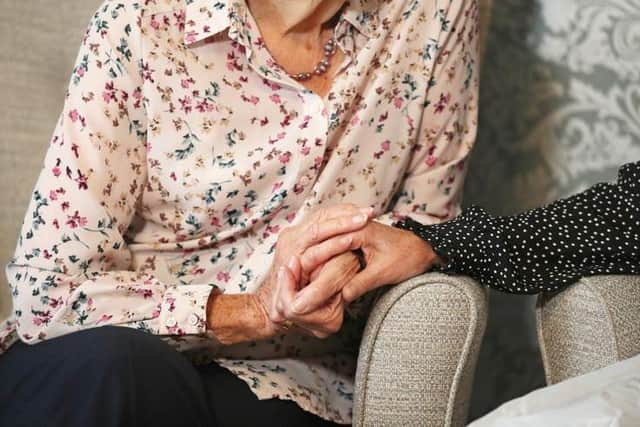'Mass exodus' of Wigan care home staff due to compulsory Covid jab rules fails to materialise
and live on Freeview channel 276
There were predictions of a major staff shortages after compulsory staff jabs - aimed at protecting vulnerable residents - were introduced last year.
Care workers in England needed to have at least one dose of the coronavirus vaccine by September 16 to continue working, and two doses by November 11.
Advertisement
Hide AdAdvertisement
Hide AdBut the “mass exodus” of employees has failed to materialise in Wigan at least.


NHS England data shows 2,750 people were working in older adult care homes across Wigan on January 2 – the most recent date for which figures are available.
This was just three fewer than the 2,753 recorded on July 18 – days before a 16-week “grace period” for care workers to get their first jab started.
Across England, the number of staff in older adult care homes dropped by 17,000 over the same period.
Advertisement
Hide AdAdvertisement
Hide AdAnd with both the local and national figures, it is unclear how many workers left as a result of the mandatory vaccine policy.
The Government announced it is relaxing immigration rules to make up for “severe and increasing difficulties” with recruitment and retention in the care sector. It follows a recommendation from the Migration Advisory Committee that care jobs be made eligible for the health and care visa, designed to help migrants get work visas to fill jobs where there are shortages.
Care providers are experiencing high vacancy rates and turnover, and pressure on staffing is being exacerbated by the spread of the Omicron variant.
Sam Monaghan, chief executive of MHA, the UK’s largest charitable care provider, said: “Essential care and support for older people is facing a staffing crisis the likes of which we have never seen before.
Advertisement
Hide AdAdvertisement
Hide Ad“The changes to immigration rules are a very welcome step forward in addressing the ongoing care staffing crisis.
“However, it will be some months before older people feel the benefit of these much-needed changes.”
Vic Rayner, chief executive of the National Care Forum, said it was “imperative” that all organisations will be able to use the scheme “at speed”.
She added: “At present it is complex, and organisations currently using it for wider roles recognise the financial and bureaucratic burdens inherent in the system.”
Advertisement
Hide AdAdvertisement
Hide AdThe NHS data shows 2,635 workers at older adult care homes in Wigan had received two Covid jabs by January 2 – 96 per cent of staff employed on that date, and up from 2,097 on July 18.
Across England, 95 per cent of older adult care home workers have received two doses of a Covid jab.
The Department for Health and Social Care said new starters can be deployed to work care homes 21 days after receiving one dose of the vaccine and are required to get a second jab within 10 weeks.
Others not fully vaccinated may consist of those on maternity leave, long term sickness or otherwise not currently deployed, a DHSC spokeswoman added.
Advertisement
Hide AdAdvertisement
Hide AdThey said £462.5m had been provided for recruitment and retention, and the department was working with the care sector to encourage booster uptake.
Thanks for reading. If you value what we do and are able to support us, a digital subscription is just £1 for your first month. Try us today by clicking here and viewing our offers.
